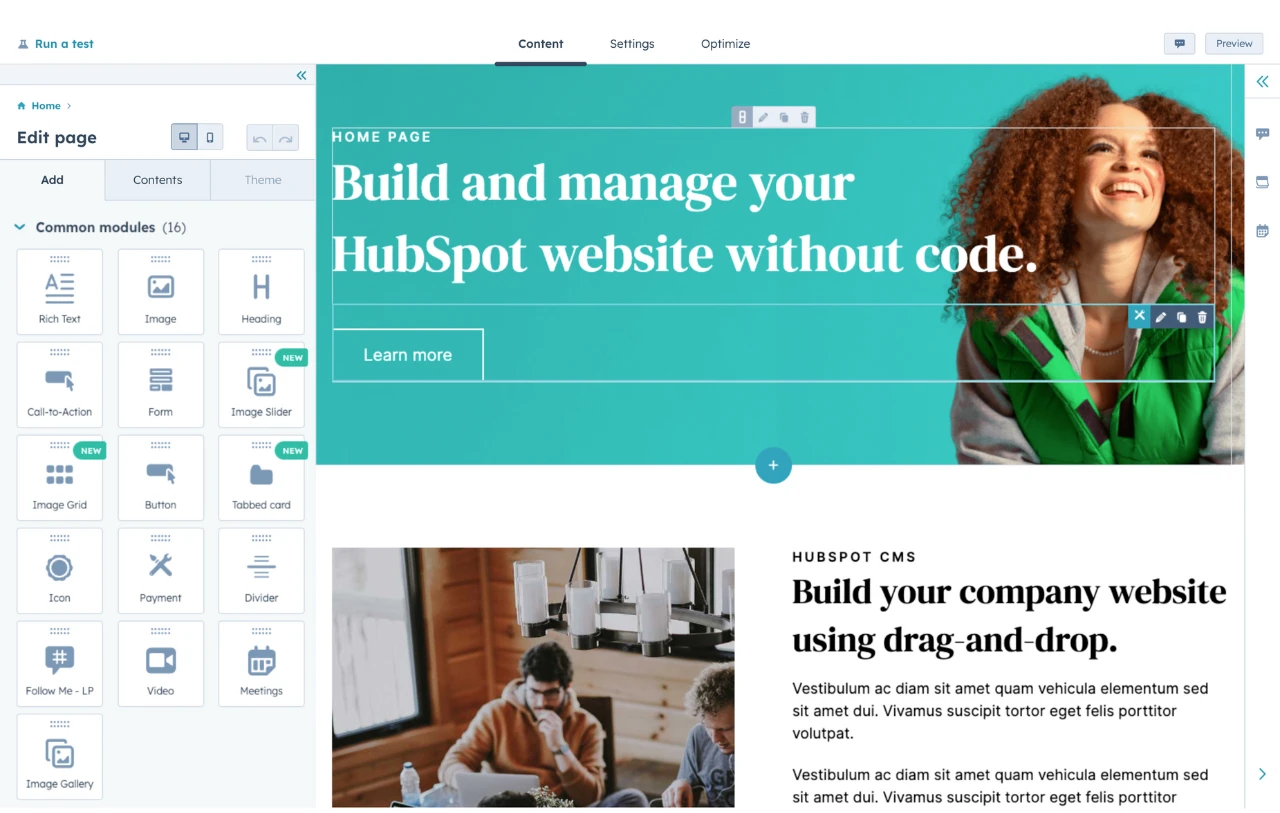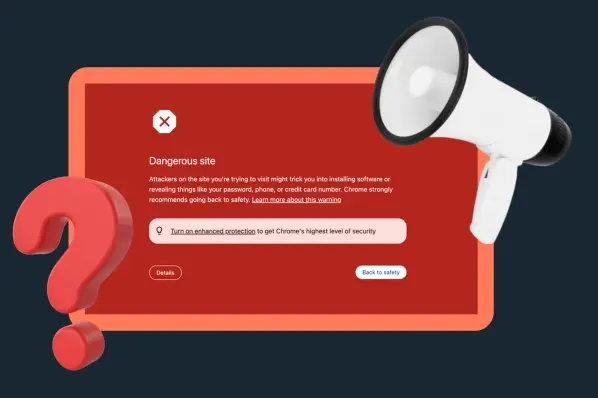Web content best practices seem to be constantly shifting, and staying on top of them can be a real challenge. As a copywriter, I know the struggle firsthand — SEO tips, AI optimization, and readability techniques seem to evolve on a daily basis.
But sometimes, you have to go back to the basics to keep your website in top shape. One fundamental of a high-performing website is loading speed, and optimizing your Largest Contentful Paint (LCP) is one key way to manage it.
In this article, we’ll cover the basics of LCP and how you can apply it to your company’s site.
Table of Contents
- What is Largest Contentful Paint?
- Why is the LCP important?
- Largest Contentful Paint Performance Challenges
- What's a good LCP score?
- How to Improve Your LCP Score
What is Largest Contentful Paint?
Largest Contentful Paint measures how quickly the largest visible element on a webpage loads. It‘s a core component of Google’s user experience-focused Core Web Vitals, which directly impacts how users perceive your site and how search engines rank it.
LCP tracks the time it takes for the largest element — like an image, video, or text block — to appear in the viewport (the visible area of your screen). As new “largest” elements load, the LCP measurement updates, with the final score based on the last entry.
Key elements that affect LCP include:
- Images: The displayed size on the page determines their impact
- Videos: Similar to images, their visible dimensions are key
- Text Blocks: Measured by the size of their containing box

HubSpot's Free Website Builder
Create and customize your own business website with an easy drag-and-drop website builder.
- Build a website without any coding skills.
- Pre-built themes and templates.
- Built-in marketing tools and features.
- And more!
Unlike First Contentful Paint (FCP), which measures the time until the first element appears, LCP focuses on the most visually impactful content. The largest element may vary between desktop and mobile views, so optimizing across devices is essential.
Why is the LCP important?
LCP is critical in shaping user experience, influencing how visitors engage with your site and how search engines rank it. Here's why LCP matters.

LCP impacts SEO.
Google uses LCP as a key ranking factor. Your Core Web Vitals score consists of three elements: Largest Contentful Paint (LCP), Interaction to Next Paint (INP), and Cumulative Layout Shift (CLS).
A fast LCP tells Google your site provides a good user experience, boosting its visibility in search results. Considering that only 0.63% of people click on the second page of Google search results, every ranking factor counts.
LCP improves engagement.
A quick-loading site keeps visitors exploring instead of bouncing. According to Amazon Web Services, 88% of online shoppers won‘t return after a poor user experience. Speed isn’t just about first impressions — it's about building lasting relationships with your users. Good LCP is the difference between visitors staying to explore or hitting the back button.
LCP drives sales.
Across every industry, your site's loading speed directly impacts your bottom line. The data is clear: faster sites sell better. B2B sites that load in 1 second achieve conversion rates 3 times higher than those taking 5 seconds. For e-commerce, the impact is nearly as dramatic. Sites with 1-second load times convert 2.5 times better than their 5-second counterparts.
By improving LCP, users can interact with key elements (like product images or “Buy Now” buttons) faster, mitigating the chance of abandonment.
Largest Contentful Paint Performance Challenges
When I talked to Killian Kelly, Marketing Manager at HubSpot, he compared diagnosing LCP performance challenges to fixing a car. Sometimes, it’s a quick fix, like compressing an image, similar to changing a flat tire. Other times, it’s a complete engine overhaul, like reworking your page’s resource-loading strategy.
From quick fixes to major repairs, here are some common challenges to LCP performance.
Not Optimizing for Mobile Devices
Many websites have a decent web LCP, but their mobile LCP is abysmal. If you‘re not optimizing for mobile, you’re missing out on your biggest audience. Here's the reality: 77% of global retail site traffic now comes from smartphones, driving 68% of online shopping orders. Yet mobile pages typically take 70.9% longer to load than their desktop counterparts.
Oversized Images
Images are your website’s headliners — they grab attention, tell a story, and make your products pop. However, they're often the heaviest elements on your page, making up an average of 64% of a webpage's total weight. When these images aren't properly optimized, they can be the biggest culprits for slow load times.
Render-Blocking Resources
Imagine your website‘s content is stuck in traffic behind a slow-moving truck. That’s what render-blocking resources do to your page load. These files, typically JavaScript or CSS, force the browser to stop everything else while they download, parse, and execute.
Even if your largest contentful paint is ready to go, it won’t render until the blocking resources have been fully executed.
Inefficient Resource Loading
Resource Load Delay is the gap between your server‘s first response and when it actually starts downloading your LCP element. When your webpage loads unnecessary resources first or doesn’t prioritize the important ones, it's adding costly seconds to your LCP score. Seconds your consumers might not wait for.
What's a good LCP score?
Google sets clear and straightforward standards for a good Largest Contentful Paint score.
- Good: ≤ 2.5 seconds
- Needs Improvement: 2.5–4 seconds
- Poor: > 4 seconds
Despite clear standards, only 33% of websites globally make the cut. That’s like saying two-thirds of websites are still stuck in internet traffic.
How to Improve Your LCP Score
Now that we know what we‘re aiming for, let’s walk through the process of improving your LCP score.

Focus on diagnostics.
Before diving into optimizations, it’s important to establish a baseline for your website's performance. If you’re evaluating an entire website or a set of pages, you’ll need to measure the LCP score for each page. The LCP score will vary depending on the specific content and structure of each page.
Measure Current LCP
- Run a performance test to determine your current LCP.
- Identify the specific element on each page that is triggering the LCP measurement. Remember, when analyzing multiple pages, each will have its own LCP element to address.

HubSpot's Free Website Builder
Create and customize your own business website with an easy drag-and-drop website builder.
- Build a website without any coding skills.
- Pre-built themes and templates.
- Built-in marketing tools and features.
- And more!
Tools for Measuring LCP
- Google PageSpeed Insights uses data from the Chrome UX Report to provide clear real-world performance insights for websites.
- Chrome DevTools Performance panel also uses data from the Chrome UX Report. The difference is that it generates a broad range of data that is harder to interpret but great for in-depth diagnostics.
- Lighthouse is actually a tool within Chrome DevTools that gives clear, actionable insights about web performance. Also, you can install it as a browser extension for easier access.
- WebPageTest does not rely on real-world data. Instead, it conducts tests in a controlled environment, allowing you to manage variables such as device, browser, location, and connection speed. This tool helps assess the impact of your optimizations.
Optimize your LCP element.
The lighter your website, the better — because lighter websites load faster. Before investing time in optimization, ask yourself:
- Do I really need this content?
- Does this element need to be the LCP?
- Could it be moved below the fold without affecting user experience?
- Is there a more important element that should load first?
Work on image optimization.
If your LCP element is an image, ensure it follows the best formatting and loading practices.
Image Format
- JPEG: Best for photographs and complex images with many colors.
- PNG: Best for graphics or logos with crisp lines (uses lossless compression but has larger file sizes).
- WebP: Smaller file sizes compared to JPEGs and PNGs. Offers lossy and lossless compression but has limited compatibility with older browsers.
Image Loading Strategy
- Always compress your images to reduce file size.
- Use responsive images that are appropriately sized for different devices. Responsive images changed their size and resolution depending on the screen size.
- Enable lazy loading for images below the fold to prioritize the LCP content.
CMS and Website Builder Considerations
While platforms like Squarespace, Wix, HubSpot, and WordPress automatically compress images, make sure to double-check your settings.
- Verify that the built-in optimization features are enabled.
- Ensure your theme or custom code isn’t bypassing built-in optimizations.
- Use platform-recommended image dimensions and formats.
Optimize your text.
If your LCP element is text-based, focus on font management and loading strategies.
Font Management
- Stick to a maximum of two font families per page.
- Prioritize web-safe fonts like Arial, Verdana, Times New Roman, Helvetica, and Georgia. These fonts load faster as they come pre-loaded on most operating systems.
Loading Strategies for Custom Fonts
To be clear, custom fonts will take longer to load, but there are ways to minimize their load time. Some great options for this are below:
- Enable font pre-loading to ensure a visitor's browser loads essential fonts early, allowing text to render promptly without waiting for other unnecessary files to load.
- Use a font-display swap strategy. This will load text in the system font first, then switch to the custom font once it’s loaded.
Optimize your code.
Remove Render-blocking resources. Usually, these resources are JavaScript and CSS files. Depending on your website, the strategy for addressing this issue changes.
Website Builder Websites
Use built-in optimization tools, but note that your options are limited. In general, there are ways to manage render-blocking resources for code that you added — but it’s not possible to change the webbuilder’s coding.
CMS Platforms
CMS platforms offer plugins to optimize render-blocking resources. These are a great option for people who cannot code. But be warned, not all plugins are created equal. Additionally, your website is unique. We recommend shopping around and testing several platforms to find your perfect fit. I’ve listed some popular plugins below.
- WordPress: WP Rocket, Autoptimize, W3 Total Cache
- HubSpot: HubSpot CMS Optimizer, Advanced JavaScript and CSS Optimizer
Developer Considerations
For people with a CMS or custom website who are looking to work with a developer or code themselves, focus on applying these strategies:
- Implement critical CSS.
- Defer non-essential JavaScript.
- Minimize main-thread work.
- Optimize the critical rendering path.
Focus on server optimization.
Your server configuration plays a crucial role in LCP performance. You can have a perfectly optimized website, but if you have a bad server, your LCP score will stay poor.
Website Builder's Hosting Options
- Understand that server optimization options are limited.
- Focus on content optimization instead.
- Consider upgrading to premium hosting tiers if available.
CMS Platforms or Custom Website Server Solutions
- Enable browser caching.
- Implement server-side caching.
- Use a Content Delivery Network (CDN).
- Configure GZIP compression.
- Consider upgrading server resources.
Measure success.
After implementing changes, it’s vital to track the results.
- Run regular performance tests.
- Monitor Core Web Vitals in Google Search Console.
- Track changes in user engagement metrics.
- Document which optimizations had the biggest impact.
Remember, improving LCP is an iterative process. Start with the most impactful changes and continuously monitor and adjust your optimization strategy based on results.
Conquer LCP One Step at a Time
Improving your website’s LCP score can feel overwhelming, but it’s all about small, deliberate actions. Writing this reminded me that progress — whether it’s resizing an image or optimizing code — comes from tackling one step at a time.
Like writing an article, each tweak brings you closer to a polished result. Start small, stay consistent, and soon, your site will deliver the fast, user-friendly experience your visitors expect.

HubSpot's Free Website Builder
Create and customize your own business website with an easy drag-and-drop website builder.
- Build a website without any coding skills.
- Pre-built themes and templates.
- Built-in marketing tools and features.
- And more!
Website Performance











![19 Website Speed Optimization Strategies for 2024 [New Data]](https://53.fs1.hubspotusercontent-na1.net/hubfs/53/how-to-optimize-website-speed-1-20241203-1468927.webp)